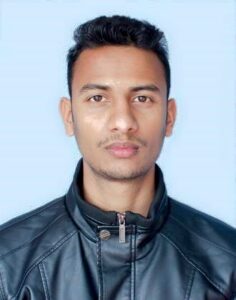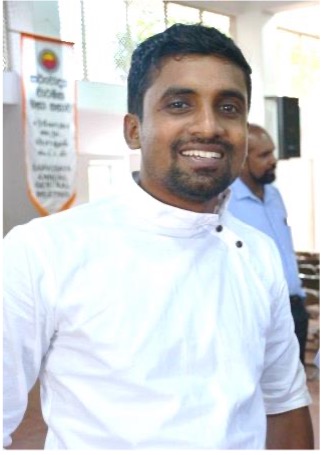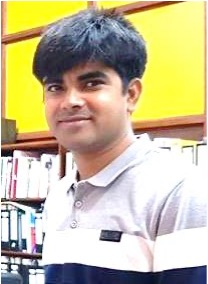 Padam Raj Awasthi (Nepal)
Padam Raj Awasthi (Nepal)
Padam cherishes the wonderful learning opportunity he received as a Leadership For Life Worldwide (LFLW) Fellow. A month long Fellowship program was full of learning and experiencing real world problems that most of the subsistence agro based economies are facing. He was constantly hit by the situation of farmers and micro entrepreneurs in Bangladesh. He plans to reflect more and involve himself towards addressing the many problems farmers encounter. He strongly believes that, organic leadership is needed to understand the real world problems of the local people and development interventions need to be designed and implemented accordingly. He is planning to incorporate the learnings especially the experiences with farmers in his entrepreneurial journey. He is always grateful to all the people who were directly/indirectly involved in this fellowship journey. He hopes more people around the world will be able to learn from this fellowship and it will ultimately create a global network of alumni to seek sustainable solutions to multiple socio-economic problems existing in the region.
 Astha Khathri (Nepal)
Astha Khathri (Nepal)
The month long fellowship exchange was an opportunity for Astha to observe and learn about the Sarvodaya Movement - its history, organisational culture and operational systems. She saw how different units at Sarvodaya functions and how they work independently to achieve Sarvodaya’ s vision. She was particularly impressed by Sarvodaya’s focus on self-sustainability through various initiatives and this has been her key takeaway for Teach For Nepal. She also explored how to invest early on generating resources required for sustainability and growth.
While reading for her MBA, Astha works as a Program Manager at Anuvuti International, a sister organisation of Teach for Nepal. Anuvuti International designs service learning programs for international volunteers and provides learning opportunity and study abroad programs. Astha was placed at Sarvodaya International Unit (SIU) and the Sarvodaya Institute of Higher Learning during her fellowship to research on international volunteer’s interest in visiting Sarvodaya / Sri Lanka. She explored how Sarvodaya hosts diverse international groups sharing Sarvodaya’s community development experience to different audiences.
One of her important insights was research and contextual understanding of community for effective program design, this came through strongly in her field visits. Astha delivered her first public speech at the Sarvodaya Institute of Higher learning at Bandaragama to a group of ladies undergoing training through the Sarvodaya Women’s Movement. Astha experienced hands-on what experiential learning is about as well as sharing her Nepali experience with Sarvodaya colleagues. She was the centre of attention at Sarvodaya due to her friendly, approach and wisdom sharing. Apart from her fellowship activities Astha made sure she took her personal travels to explore country. We believe Fellows should have adequate leisure with a keen taste to know about the local culture and peoples. She loved her experience and is helping LFLW to reach to new heights.
 Eranda Nishan (Sri Lanka)
Eranda Nishan (Sri Lanka)
Eranda is a Programme Coordinator for the Field Operations Department of Sarvodaya. He mainly manages and coordinates the Sarvodaya Farms which is overseen by the same department. Eranda is pursuing studies in agriculture management and explores how he could promote organic agriculture and agro initiatives. Eranda was placed in SOJAG due to his special interest in agriculture and SOJAG’s extensive agriculture programmes.
Eranda observed how SOJAG connected income generating programs which linked the informal sector with private institutions which ultimately led to social enterprises within the communities. He explored the paddy programme, seed sharing, animal husbandry, fish seeds programme and how SOJAG promotes agriculture as a key programme.
Ever since he got back, he contacted private organisations in Sri Lanka to promote likeminded activities. He is already utilising his learnings from SOJAG to promote agricultural initiatives through Sarvodaya. This partnership program will fill in the supply chain which will then create a network that leads to community building. The idea of not having a middle man will also be beneficial for the farmers and in return would not be exploited for their hard work. He is exploring how Sarvodaya could provide micro credit loans through Sarvodaya Development Finance for the farmers with necessary planning structures. His observations as SOJAG helped him look at things in a whole new dimension. He wants to introduce a participatory guaranteed system (PGS) and also gives the farmer credibility to sell his/her produce in the right markets. Introducing methods on increasing the efficiency of water such as the drip irrigation system or water sprinklers is also in his list of activities.
Eranda appreciates and he is thankful to SOJAG and LFLW for providing this opportunity. He is well inspired and is already implementing what he learnt in his daily work. He plans to connect with SOJAG on a frequent basis to improve his planning activities and to also promote his own work internationally.
 Ali Akbar (Bangladesh)
Ali Akbar (Bangladesh)
Ali works as an Assistant Branch Manager for SOJAG regional office. He has read for a MBA at the National University of Bangladesh. He aspires to develop the rural sector in Bangladesh through community mobilisation initiatives.
During his placement he was keen to explore Sarvodaya’s programmes on micro-finance, socio-political initiatives and spiritual awakening programmes. He explored Sarvodaya’s organisational structure, governance and their operations in depth. He appreciated how this helped him to realise how he could improve operations at his own branch and through the wider SOJAG network. Sarvodaya placed him with the Field Operations Department which coordinates the twenty six Sarvodaya District centres around the island. As a field operations worker at SOJAG, it helped him to experience how to conduct and coordinate different field level activities. As part of this programme Ali visited rural Sarvodaya Shramadana Societies to understand the grassroots level operations. He had the opportunity to share his knowledge with the rural society groups how they conduct their micro-credit programme as well as the community health initiatives at the rural level. Ali was inspired by the Sarvodaya orphanage services and he also explored the project on de-institutionalisation of children. He wishes to replicate this programme in Bangladesh to address the increasing cases of orphaned children. Ali wishes to keep in touch with Sarvodaya through SOJAG to collaborate on different aspects, especially to create global village to village level partnerships.
 Ashraful Islam (Bangladesh)
Ashraful Islam (Bangladesh)
Ashraful works as an IT Manager at SOJAG HQ in Bangladesh. He aspires to become a well-known and respected leader in the development sector of Bangladesh especially advancing social conditions with technology. He wants to become sincere, dedicated, and strong in communication and to give attention to detail to strive for excellence as well as to take SOJAG to greater heights excelling in his career endeavours. He has read for a Masters in Computer Engineering at Mawlana Bhashani Science & Technology University.
Ashraful received his placement at the Sarvodaya Shramadana Movement. His goal was to expand his horizons exploring into depth how Sarvodaya excelled in community development in Sri Lanka. Apart from that goal he had the opportunity to work closely with Sarvodaya Fusion (Sarvodaya’s ICT organisation) which provides different community based IT solutions to both rural and urban sector youth and students. Ashraful attended few outreach programmes conducted by Fusion and observed how Fusion conducts diverse programmes in different sectors.
During his placement, he had the opportunity to grow in a positive environment that promotes personal growth. He took part in a youth leadership initiatives with Sarvodaya Shanthi Sena attending a youth camp and speaking to rural youth on their experience and how they conduct related activities in Bangladesh. In doing so, he appraised of the opportunity given to him to experience things in real keeping up-to Sarvodaya’s values to promote experiential learning. Ashraful emphasised that he had the opportunity to stay for longer in-order to learn more and share his experience with Sarvodaya.

